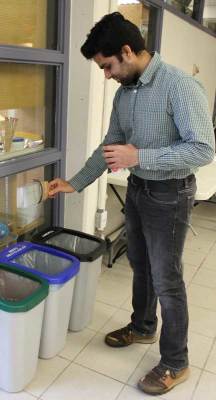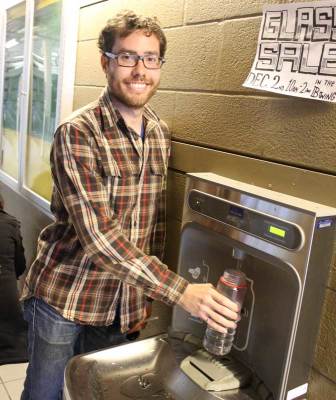Co-op students help nurture college’s green efforts

Kiran Gokarn has a Masters in physical chemistry from the University of Mumbai and now he wants to take his knowledge back to India and bring up-to-speed with Western trends. (Photography by Mehreen Shahid/ The Sheridan Sun)
STORY BY MEHREEN SHAHID
The repair café, the sorting bins, the green printers and reducing paper cup waste are just some of the projects taken by Sheridan’s office of sustainability.
Aware of being characterized as preachy and overbearing by students, the office has hired two co-op students to be its representatives.
Michael McMillan learned about the opening from the Sheridan job board. It seemed like the perfect opportunity in sync with his post-graduate certificate in Environmental Control.
“I thought it was fantastic,” he said. “I could see how all the courses I was taking would be relevant.”
For fellow co-op student, Kiran Gokarn, this is more than just a school job—it’s his first job ever, and so far he likes it.
“Not only are you working but you’re also trying to make things around you better and on a very practical level, and that’s a very rewarding,” he said.
As students, they have been involved in various projects, with the main objective being disseminating knowledge about sustainability and green practices.
“Most people do think about the environment when they think of sustainability,” said McMillan. “It’s not just that it’s a balance between economics and social well being and ecological health.”
MORE RELATED TO THIS STORY:
- Putting a lid on waste paper cup
- We can build it, we have the technology
- Sheridan’s waste audit digs deep
One of their current tasks is to assess how sustainability is currently incorporated into the curriculum at Sheridan.
McMillan, 32, explained, “for example, if one of the learning outcomes in your journalism course was that you were going to be covering stories on sustainability issues and topics.” And this means students reading the newspaper are learning something about sustainability.
What McMillan and Gokarn have found is that a lot of courses at least touch upon the issue of sustainability. Courses such as Emerging Building Technologies (Architecture Technology), Environmental Graphic Design (Bachelor of Design) and courses in the Bachelor of Interior Design program have sustainable segments.

Michael McMillan has a bachelor’s degree in chemical and biochemical engineering from Western University and wants to follow the example his dad has set by promoting green practices at home.
With the help of activities, McMillan said, student interaction has shown us how interested youth is in matters relating to sustainability.
Speaking about the coffee cup waste reduction campaign, Gokarn said, “through this we’re trying to engage students to promote the concept of recycling because we have Zero Waste Volunteers from different programs across campuses getting co-curricular records.”
Through these plans the office of sustainability is trying to stress the need to think once before throwing something out. Maybe it can be saved, added the 24-year-old from India.
The office is trying to streamline the process to donate any surplus and unused material to charitable organizations.
Earlier, the college was putting away discarded furniture in the tunnel. “But now we have decided, it’s been finalized, that we’re donating all our used furniture to Habit for Humanity,” said Gokarn.
He feels his experience has made him more mindful of his consumer behaviour.
“If I have to go to a grocery store, I look at not having too many plastic bags,” he said, reflecting on how his behaviour has changed due to his knowledge about sustainable practices.
The opportunity to put theory into practice has reinforced McMillan’s belief in the future of sustainability.
“I feel hopeful going forward,” he said. “Something like the repair café is that it becomes a community event where we’re teaching and sharing and making everything accessible and equitable for everyone.”




